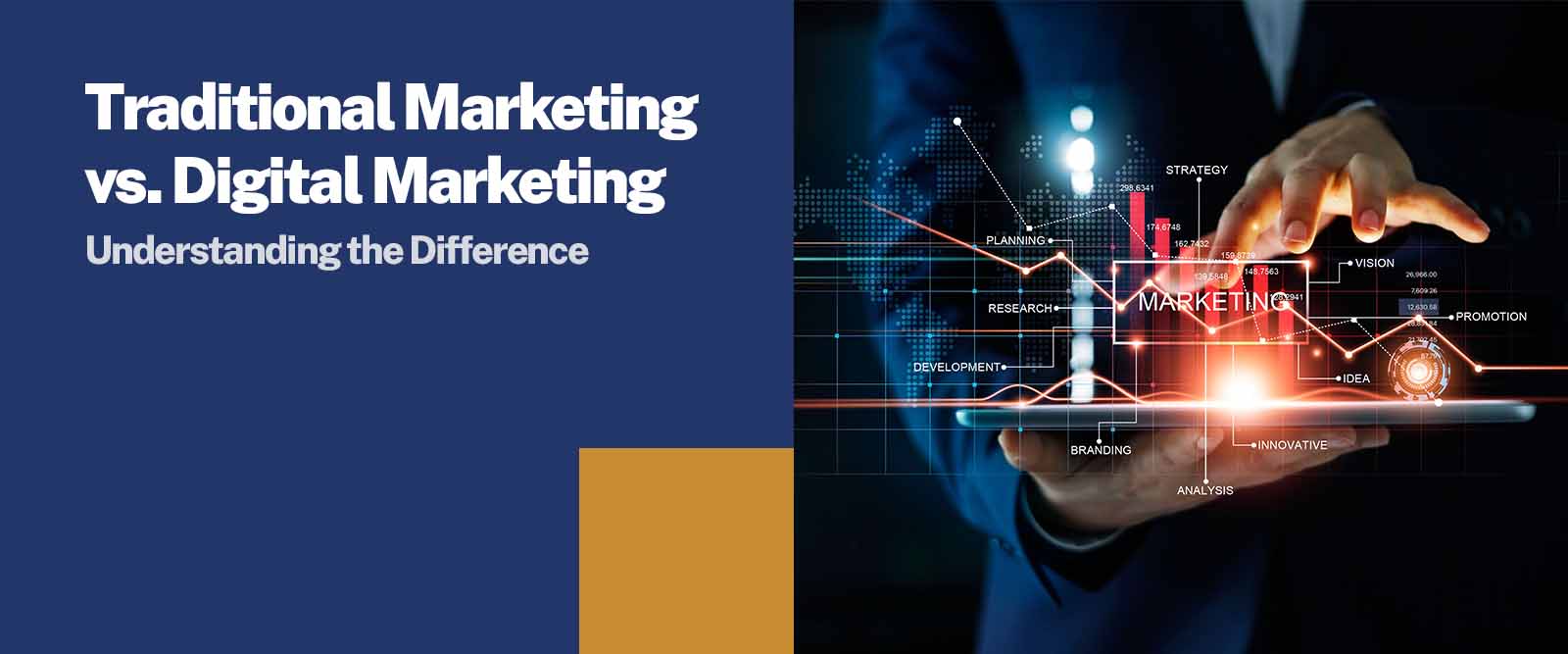5800 students unlocked their dream jobs with UG/PG programs in top colleges. Apply Now!
In today's ever-changing business landscape, marketing has become an essential tool for companies to reach and engage with their target customers. While traditional marketing methods such as print ads, TV commercials, and billboards have been around for decades, digital marketing has emerged as a new and powerful alternative that offers unprecedented targeting, tracking, and interactivity.
In this article, we will differentiate between traditional and digital marketing, two broad categories of marketing that you will usually learn about in a PGDM course. In general, a PGDM degree provides a comprehensive and practical education in various aspects of marketing, such as market research, consumer behaviour, branding, advertising, digital marketing, and more. You can build your career in digital marketing after pursuing a PGDM degree.
[Also read: PGDM in Marketing]
Traditional Marketing vs Digital Marketing: An Overview
Traditional Marketing
- Traditional marketing refers to the traditional channels and tactics used to promote a product or service to a large audience.
- One of the primary advantages of traditional marketing is its broad reach. A television or radio commercial can reach a large audience of potential customers, while a billboard can generate significant exposure for a brand.
- Additionally, traditional marketing tactics are often familiar and well-understood by consumers, which can make them more effective in certain contexts.
Digital Marketing
- Digital marketing, by contrast, refers to the use of digital channels and tactics to promote a product or service to a targeted audience.
- One of the primary advantages of digital marketing is its precise targeting capabilities. Digital marketers can target specific audiences based on demographics, interests, behaviours, and other factors. This ensures that the brand's message reaches people who are likely to be interested in its product or service.
- Additionally, digital marketing tactics can be highly cost-effective, as many digital channels are free or low-cost to use.
Traditional Marketing vs Digital Marketing Examples
|
Traditional Marketing |
Digital Marketing |
|
Print Ads |
Search Engine Optimisation (SEO) |
|
Television and Radio commercials |
Pay-per-click (PPC) advertising |
|
Direct Mail |
Social Media |
|
Billboards |
Email Marketing |
|
Other forms of Outdoor Advertising |
Content Marketing |
Disadvantages of Digital Marketing versus Traditional Marketing
Traditional Marketing
- Traditional marketing has limited targeting capabilities, which means that a brand may spend significant money on advertising to people who are not interested in its product or service.
- Additionally, traditional marketing can be expensive, especially for smaller businesses with limited budgets.
- Finally, it can be difficult to track the effectiveness of traditional marketing tactics, which makes it hard to optimise the marketing strategy.
Digital Marketing
- Digital Marketing has a fast pace and constant evolution, which means that marketers need to stay up-to-date with the latest trends and best practices in order to be effective.
- Additionally, digital marketing tactics can be complex and require specialised skills, which may require additional training or the hiring of outside experts.
- Finally, digital marketing can be vulnerable to changes in technology or algorithms, which can impact the effectiveness of a marketing strategy.
Difference Between Traditional and Digital Marketing
While both traditional and digital marketing aims to promote products or services and persuade customers to take a desired action, they differ in many ways. Here are some of the main differences between the two:
Cost
- Traditional marketing often requires a substantial investment in print, TV, radio, or outdoor advertising space, as well as production costs for creating the ads.
- Digital marketing, on the other hand, can be more cost-effective, as many digital channels are free or low-cost to use, and you can target a specific audience without paying for broad exposure.
Reach
- Traditional marketing can offer broad visibility, such as a TV ad during a popular show, a billboard on a busy highway, or a magazine ad with a wide readership. However, traditional marketing may not be able to target a specific audience as precisely as digital marketing can.
- Digital marketing allows you to reach a highly targeted audience through social media, email marketing, PPC ads, and other digital channels.
Targeting
- Traditional marketing can be less precise in terms of targeting. For example, a billboard on a highway may reach a broad audience, but only a small percentage of them may be interested in your product.
- Digital marketing allows you to use data and algorithms to target specific demographics, interests, behaviours, and locations, which can improve the relevance and effectiveness of your messages.
Tracking
- Traditional marketing can be difficult to measure and track, as it relies on indirect metrics such as viewership, readership, or foot traffic.
- Digital marketing, on the other hand, provides a wealth of real-time data and analytics that allow you to measure the performance of your campaigns, test different variations, and optimise your strategy for better results.
Interactivity
- Traditional marketing is often a one-way communication that does not allow immediate feedback or engagement.
- Digital marketing, on the other hand, allows for two-way communication and engagement with customers through social media conversations, website chats, or email responses. This interactivity can build relationships, trust, and loyalty with customers.
Overall, while traditional marketing still has its place in certain industries and contexts, digital marketing is increasingly becoming the preferred and more effective method for many businesses. By understanding the difference between traditional marketing and digital marketing, you can design a marketing strategy that leverages the strengths of both and achieves your business goals.
Conclusion
If you are interested in pursuing a career in digital marketing or enhancing your marketing skills, consider a postgraduate diploma in management or PGDM degree with a specialisation in marketing. There are several Sunstone-powered colleges that offer PGDM program that aligns with the industry's needs.
Sunstone is a higher education services provider that aims to prepare students for successful careers in their fields with in-demand advanced certifications and effective learning modules. To know more about the benefits of Sunstone, reach out to us today!
FAQ - Traditional Marketing vs. Digital Marketing
Which is more effective digital marketing or traditional marketing?
Both traditional and digital marketing aims to promote a product or service and persuade customers to take a desired action. Both also require a clear understanding of the target audience, a compelling message, and a strong brand identity.
What are the similarities between traditional and digital marketing?
Both traditional and digital marketing aim to promote a product or service and persuade customers to take a desired action. Both also require a clear understanding of the target audience, a compelling message, and a strong brand identity.
Is it easier to track traditional marketing or digital marketing programs?
Digital marketing is generally easier to track than traditional marketing, as it provides real-time data and analytics that allow marketers to measure the effectiveness of their campaigns and optimise their strategy. Traditional marketing relies on indirect metrics such as viewership, readership, or foot traffic, which can be harder to measure and track accurately.
HELP
Take the first step towards your dream job.
ABOUT THE AUTHOR

